Text


ARTEMIS: lady of wild things, deep florests and huntress; mistress of the moon and guardian of the young girls and women.
7K notes
·
View notes
Text
I’ve gotten a fair number of questions over the past few months about how to properly end hymns and prayers. And the short answer is, there isn’t a specific way. I know that’s not much help though, so here’s a compilation of endings from different classic hymns to the Theoi. For some inspiration and ideas.
Orphic Hymns:
Propitious grant our just desires success, accept our homage, and the incense bless.
Hear, blessed Dian [Artemis], and accept my pray'r, and make the infant race thy constant care.
Be present, Goddess, to thy suppliant’s pray'r, desir’d by all, whom all alike revere, Blessed, benevolent, with friendly aid dispell the fears of Twilight’s dreadful shade.
The world’s best element, light-bearing pow'r, with starry radiance shining, splendid flow'r, O hear my suppliant pray'r, and may thy frame be ever innocent, serene, and tame.
Propitious on these mystic labours shine, and bless thy suppliants with a life divine.
Shine on these sacred rites with prosp'rous rays, and pleas’d accept thy suppliant’s mystic praise.
O, best of beings, of a subtle mind, propitious hear to holy pray'rs inclin’d; The sacred rites benevolent attend, and grant a blameless life, a blessed end.
Propitious to these sacred rites incline, and crown my wishes with a life divine: Add royal health, and gentle peace beside, with equal reason, for my constant guide.
In summary: “Enjoy my hymn and offerings, and grant me favor.”
Homeric Hymns:
And now, queen of the land of sweet Eleusis and sea-girt Paros and rocky Antron, lady, giver of good gifts, bringer of seasons, queen Deo, be gracious, you and your daughter all beauteous Persephone, and for my song grant me heart-cheering substance. And now I will remember you and another song also.
And I will never cease to praise far-shooting Apollo, god of the silver bow, whom rich-haired Leto bare.
And so, farewell, son of Zeus and Leto; but I will remember you and another hymn also.
Hail, goddess, queen of well-builded Cyprus! With you have I begun; now I will turn me to another hymn.
Hail, sweetly-winning, coy-eyed goddess! Grant that I may gain the victory in this contest, and order you my song. And now I will remember you and another song also.
And so hail to you, lord: in my song I make my prayer to thee!
And so hail to you, Son of Zeus and Maia; with you I have begun: now I will turn to another song! Hail, Hermes, giver of grace, guide, and giver of good things
In Summary: “Hail! I’ll keep signing your praises.”
Callimachus’ Hymns:
Hail! Father, hail again! And grant us goodness and prosperity. Without goodness wealth cannot bless men, nor goodness without prosperity. Give us goodness and weal.
O happy hearth of islands, hail to thyself! Hail also to Apollo and to Her whom Leto bare!
Hail, goddess, and have thou Inachian Argos in thy keeping! Hail when thou drivest forth thy steeds, and home again mayst thou drive them with joy, and do thou preserve all the estate of the Danaans.
Hail, goddess, and save this people in harmony and in prosperity, and in the fields bring us all pleasant things! Feed our kine, bring us flocks, bring us the corn-ear, bring us harvest! And nurse peace, that he who sows may also reap. Be gracious, O thrice-prayed for, great Queen of goddesses!
In Summary: “Hail! You’re awesome, please bless me.”
309 notes
·
View notes
Text
Η Λέξεις και Οι Θεοί (The Words and the Gods)
~A Guide on Respectfully Using The Greek Language in Worship and Witchcraft~

Hey Tumblr pals! I’m writing this post to speak about an issue I feel very strongly about: the Greek Language. I grew up in a Greek Orthodox Church, went to Greek School, danced in Greek Festivals and folk dance competitions (The above is a photo of myself and two friends performing a traditional Pirgousikos dance), worked part time in a Greek diner, baked (and still bake!) Baklava and Tsoureki and Koulourakia on special occasions, the whole sha-bang.
Since joining the Witchblr community I’ve met a lot of people that feel really connected to the Greek pantheon. Let me begin by saying I am in NO WAY going to discourage you from worshiping the Ancient Greek gods. That is no one’s place to say. Ancient Greek religious culture is not closed, and has influenced a TON about how we understand religion, myth, spirituality, and storytelling in the modern west. It is perfectly fine for a non-Greek person to worship Ancient Greek gods.
What I AM going to do is talk about the Greek language, and how to appropriately use it in your devotion to/appreciation of Ancient Greece, the Greek pantheon, and Greek Culture.
First, some things to understand about the Greek Language:
1. There are many forms of Greek.
The 2 most common that people learn are “biblical” (also called “ancient” or “koine” Greek), and “modern.” Each are the same language but have slightly different rules regarding how they work, and different current uses. Also keep in mind that not all regions of Greece speak Greek the same way. A person from Athens will speak differently than a person from Cyprus. Greek is a living language with nuance just like English, German, or French!
2. Biblical Greek is a highly religious language.
Like Latin in the Catholic Church, it is mostly seen and used in Greek Orthodox churches. It is the language we pray in, and it is how we connect to God. This makes it a very sacred language for many people
3. The Greek language and Christian religion were almost wiped out by the Ottoman Empire from 1453-1890s.
Greeks held on to these aspects of their ethnic identity under grueling circumstances. The Ottoman Turks were not kind to Greek Christians and worked very hard to destroy their sense of ethnic identity. Greek people today still feel the shadow of the Turkish empire because in the 1970s Turkey invaded Cyprus and illegally took the northern half of the island from Greek Cypriots. People alive today remember fleeing their homes from Turkish bombs! Again, the language is special and sacred and must be treated with respect.
—————————————————-
Now that you understand some basics about the language, here are a list of things you should NEVER DO with it:
1. DO NOT use Greek letters to spell anglicized words.
For example, you do not spell “Greek” as ΓΡΣΣΚ. That spells GRSSK which is gibberish. I’ve seen some people spell Aphrodite ΛΡΗΓΦΔΙΤΕ which literally spells LRIGTHTHITI which just looks stupid. If you are going to use Greek letters, spell actual Greek words.
2. DO NOT get it tattooed on your body without CAREFUL CONSIDERATION of why you MUST use the Greek alphabet instead of the alphabet of your language.
For example, Aphrodite may be the deity you worship, but avoid getting her name tattooed in Greek on your body unless you have a very strong spiritual or cultural connection to the language as well. Remember that this is the language a large body of people pray in and that barely survived Ottoman oppression. It is not a “cool” or “exotic” fashion statement.
—————————————————-
Next, some practices I highly encourage Greek Pantheon worshipers to do with the Greek language:
1. Study it!
Greek is an incredible language! You like the Greek gods and want to use their language to worship them and communicate with them? Learn all that you are able about Greek! Study the alphabet, order children’s books, read about the history of the language. You’ll quickly learn more than me! 😂
2. Use it (properly) in spells and prayers!
Want to use Greek characters in spells or sigils? Go for it! Just make sure you are studying the language so you can use it as appropriately as possible. It’s okay if your spelling isn’t always perfect or your grammar is a bit off, as long as you are respecting the language and those who used it and still use it by doing your best and learning from your mistakes!
3. Be careful with it!
Treat it as a special, sacred representation of a history and a people. If you have to ask yourself if the use of the language is respectful or not, it probably isn’t!
In Conclusion
I understand that there are other Greek speaking people who may disagree with some of my points here. The intention of this is not to speak the will of all Greek speakers. It is to advise non-Greek speaking witches and pagans who want to use the language in their devotion and work on how to respectfully approach this beautiful and important language.
Finally, I appreciate that you made it all the way to the end of this post! Please take this advice and have productive discussions with others about the use of languages in worship and witchcraft!
813 notes
·
View notes
Text
Hygieia, daughter of Asclepius and Epione, goddess of health and cleanliness and prevention of illness, hear me in my time of need; there are cruel individuals who have taken your name in vain. Plague ravages the streets, kindly Hygieia, come to me, come to us; destroy those who would sully your name! Cast plague upon them when it would find us, thrust them in our place. Retract your blessings from them, O Hygieia, they love you not, they seek to sully your name with the worst of sewage, come not to them Hygieia, to those who only harm you. Seek revenge on those who sully your name, Hygieia. Cast snakes and plague upon them, Hygieia, take from them your blessings, let them wallow in the filth they seek to thrust upon you like swine; come close, Hygieia, to the ones who love you, grant us safety from them and their devices, praise be upon you Hygieia.
238 notes
·
View notes
Photo

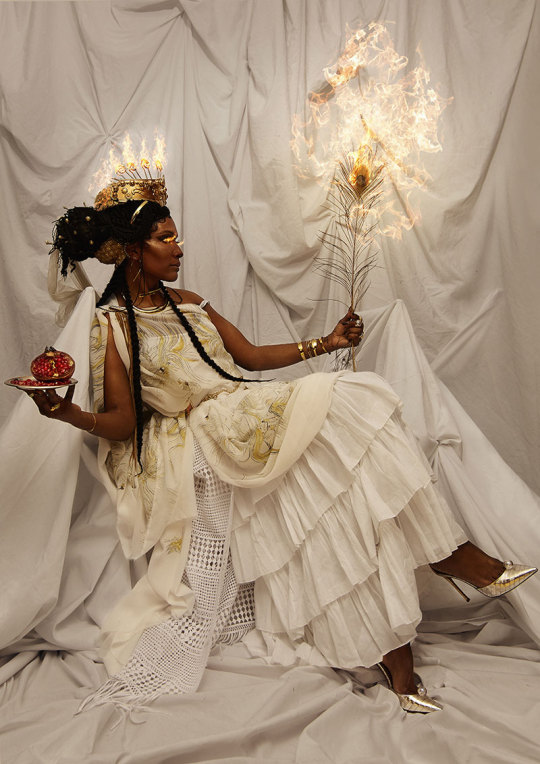

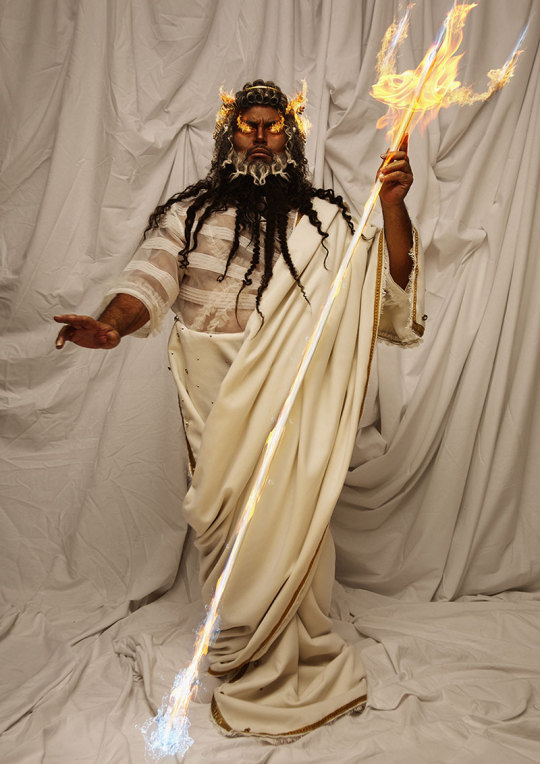

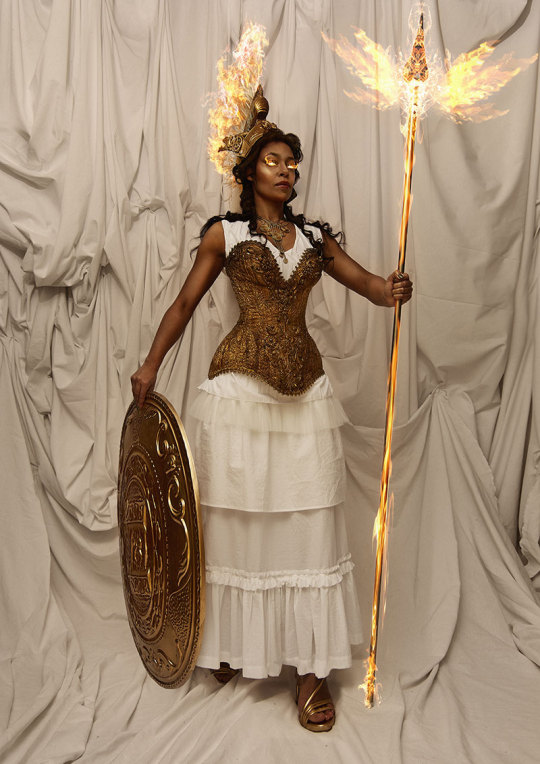



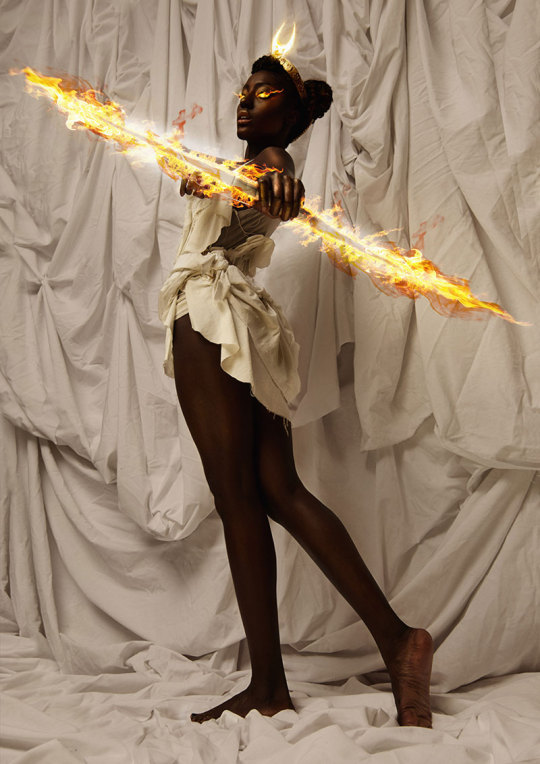
From Olympus
Photo: Ana Martinez
Styling and Creative Direction: Mario Ville (Kattaca)
Makeup design and make up artist: Lewis Amarante for Kryolan and Pankr0
Makeup and hairdressing: Sergio Jiménez
Models: Ricardo Nkosi, Mary Ruiz, Lewis Amarante, Aya Gueye, Juana Mum, Karina Soro, Ruben Buika, Virginia Buika, Isabella Menam, Oliver Lewis, Megane Mercury, Mendes Vieira, Claudia Duharte, Taylor Oscar Ruiz, David Durrant, Marina Gomes, Oscar Chibuike, Guille Gibbs, Lil Bambina, Elian Coiscou and Tigi.
194K notes
·
View notes
Text
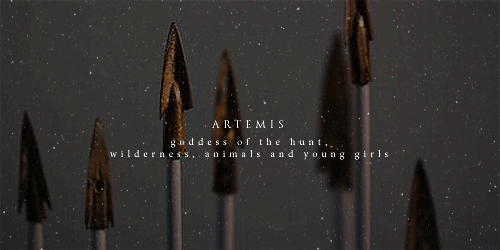
Gifts for Artemis 🏹
bow and arrows
lyre
crowns
symbols of a stag, heron, or does
cypress
mugwort
birch/pine
wildflowers
plants planted in her honor
port, cider, or mulled wine
game meat/animal blood (can also be mock blood)
honey/honey cakes
nuts
music/dance
work/tasks
fresh fruit
Here’s a small list for our warrior goddess ☀️ you are welcome to take and add what you’d like from here as gifts vary per relationship with them 🌸
423 notes
·
View notes
Text
Brief Deity Prayers
Hesita: May Hestia, who warms the hearth and brightens the home, who is ever first in the hearts of mankind, be with us: we honor you and praise your might.
Hera: May peerless Hera, friend of those who seek the joy of marriage, the solace of companionship, be with us: we honor you and praise your might.
Athena: May grey-eyed Athena, protector of cities, keeper of wisdom, who favors the virtuous, be with us: we honor you and praise your might.
Demeter: May Demeter of field and flower, mistress of all that grows in the earth, founder of the feast, be with us: we honor you and praise your might.
Aphrodite: May golden Aphrodite, whose gift it is to bring us together in love and compassion, be with us: we honor you and praise your might.
Artemis: May Artemis of the woodland, mistress of beasts, guardian of all that is innocent and wild, be with us: we honor you and praise your might.
Persephone: May noble Persephone, queen of light and dark, comfort of the sorrowing and the bereft, be with us: we honor you and praise your might.
2K notes
·
View notes
Text
Hellenism Resources
This is by no means a complete list, it’s just a collection of some sites, articles, and books I’ve found online that are interesting or useful.
Ancient Greek Cults:A Guide by Jennifer Larson
Aristotle on Religion by Mor Segev
Brutality of Citizen Wives, The by Mary E. Naples, M.A.
Collection of Greek Ritual Norms
Dionysus and His Cult and Worship; a Gender Study by Leah Hatch
Divine Appetites and Animal Sacrifice by Mat Carbon
Greek Philosophy and Religion by Gábor Betegh
Harvard’s Center for Hellenic Studies- Classical Inquires page
Harvard’s Center for Hellenic Studies-Library
Harvard’s Center for Hellenic Studies- Research Bulletin
Homer’s Gods, Plato’s Gods by Dr. Garrett
Households, Families, and Religion by Matthew Dillon
Human Transgression–Divine Retribution by Aslak Rostad
Imagining the Afterlife by Radcliffe Edmonds
Internet Encyclopedia of Philosophy
Introduction to Inner Purity and Pollution in Ancient Greek Religion by Andrej Pertovic
Meaning of Reciprocity in Ancient Greek Religion, The by A. Koutoupas
Mortal and Divine In Early Greek Etymology by Shaul Tor
Oracular Functioning and Architecture of Five Ancient Apollo Temples Through Archaeoastronomy: Novel Approach and Interpretation by Belen Martin Castro, Ioannis Liritzis, and Anne Nyquist
Pausanias’ Descriptions of Greece
Personal Religion in Ancient Greece by Emily Whitmore
Plato’s Writings
Pythagoreans, Orphism and Greek Religion by Gábor Betegh
Recovering the Past: The Origins of Greek Heroes and Hero Cult by Jorge Bravo
Rethinking Aphrodite as a Goddess at Work by Gabriella Pironti
Sacred and the Profane, The by Mircea Eliade
Theoi.com
Theoi.com- Library
Theophoric Names and the History of Greek Religion by Robert Parker
Unraveling the Eleusinian Mysteries by Mary E. Naples, M.A .
4K notes
·
View notes
Photo





Γαία
Gaia was the goddess of the earth. She was one of the primoridal elemental deities born at the dawn of creation. Gaia was the great mother of all creation - the heavenly gods were descended from her through her union with Ouranos (Sky), the sea-gods from her union with Pontos (Sea), the Gigantes from her mating with Tartaros (the Pit), and mortal creatures born directly from her earthy flesh.
697 notes
·
View notes
Text
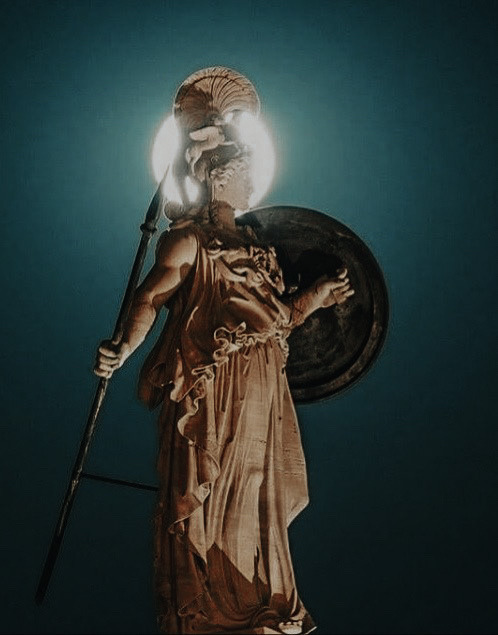
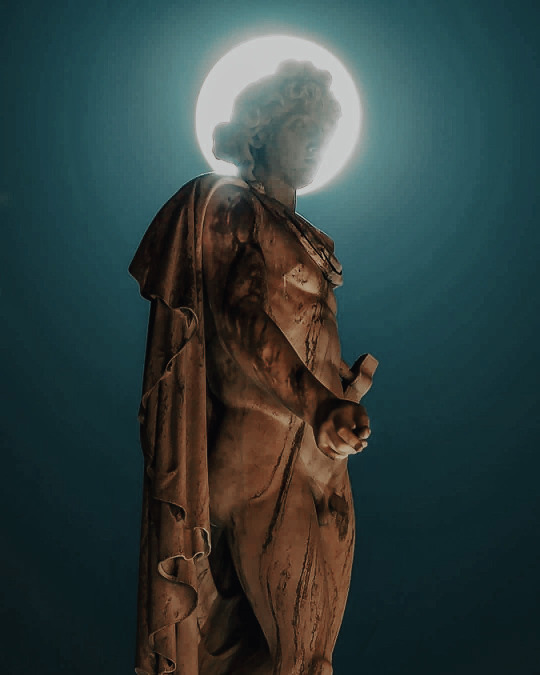
the statues of apollo and athena, at the academy athens, in a full moon night.
71K notes
·
View notes
Text
Hades/Pluto

Small devotional acts.
Donate to organizations that support suicidal individuals
Wear more metal
Eat/drink fermented things
Stay up late – enjoy the night
Help clean up cemeteries – weeding, picking up garbage, leaving fresh flowers, etc.
Get jewelry/crystals like obsidian, smoky quartz, garnet, etc.
Burn a candle, remember those who died unjustly
Use more vinegar – get red wine vinaigrette the next time you have a salad
Go searching for animal bones or fossils
Drink some mint tea
Offer coins/a few dollars to those who need it
Sit on the edge and observe
Bring flowers or a nice card for the people who work in hospice care
Start saving your spare change
Do your assigned tasks to the fullest of your ability (even if they suck)
Wear deep reds and blacks
Learn to keep your emotions in check and stay collected, when needed
Drink black coffee
Spend more time in the shade
Make responsible choices, even if they seem boring
Pay for someone’s meal
Volunteer at a nursing home
Learn CPR and the Heimlich maneuver
Plant a poplar tree
Support someone who needs to put a pet down, in whatever form that takes
Eat more chocolate
Practice your poker face
Host a dinner/visit with friends
Grow some roses
Go for a nighttime drive
PRACTICE LOVING YOURSELF
Many, many, many other things not said here
9K notes
·
View notes
Photo
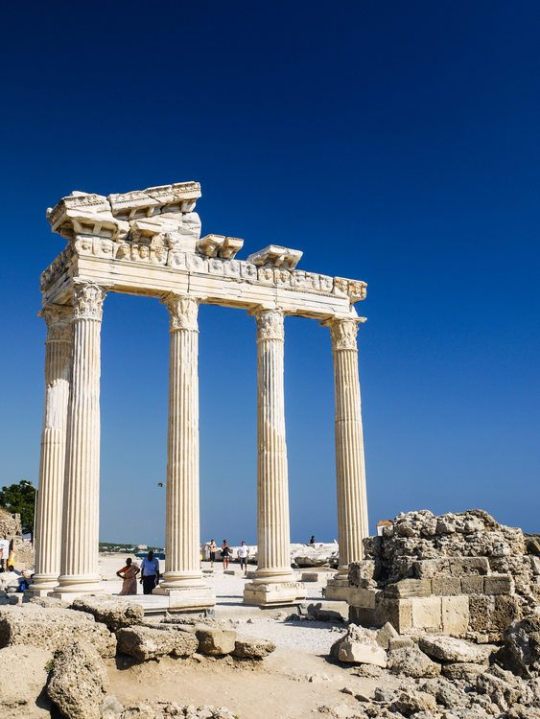
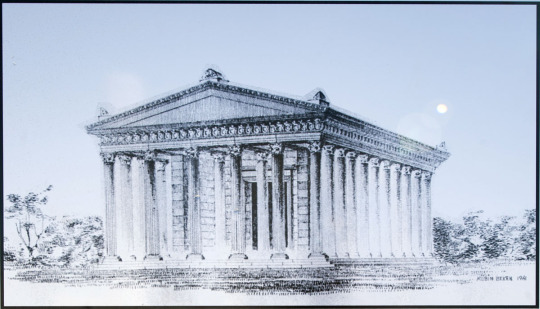

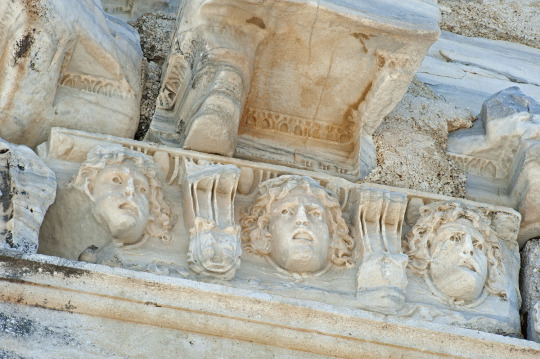
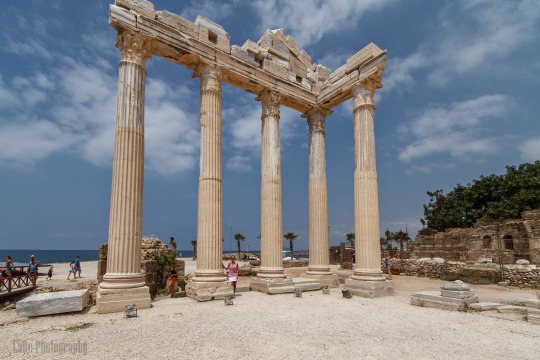



Temple of Apollo
Side, Asia Minor (Turkey)
2nd century CE
The Temple of Apollo is a hexastyle Corinthian temple in Side, Turkey. It originally had 6 front columns and 11 side ones. 5 of its columns were re erected in modern times. What made it different from other temples of that era, is its antechamber which had a pair of massive Corinthian columns. It is believed to be the place where Anthony met Cleopatra; he presented the Apollo Temple as a token of his love and devotion to her.
From an architectural point of view, this temple was a peripteros i.e. it was surrounded by a colonnade on all four sides of the inner chamber (called cella or naos). In the case of the temple of Apollo this colonnade was executed in the Corinthian order. Each longer side of the building was originally adorned with 11 columns and both shorter sides were decorated with 6 columns.
The stylobate of Apollo’s temple, that is the top step of the platform on which colonnades of temple columns were placed, has the dimensions of about 16 meters (52 feet) by 30 meters (98 feet). Five columns that are currently standing were re-erected as part of the reconstruction work carried out in the 80s of the 20th century under the supervision of Professor Jale İnan. The frieze placed above them depicts the heads of Medusa - a mythological monster that had the face of a human female with living venomous snakes in place of hair.
The two main deities of Side in Roman era were Apollo and Athena. One of the two temples built in Side during the period known as the Roman Peace is the Temple of Apollo. Apollo is known as the god of music, poetry, sun, and light in Roman mythology. The other temple constructed in this period is the Athena Temple built in the honor of Athena, the goddess of wisdom and skill. These two temples lie close to each other on the tip of Side peninsula.
It is believed to be the place where Anthony met Cleopatra; he presented the Apollo Temple as a token of his love and devotion to her. (according to a local legend, and not backed by any account)
Sources: 1, 2, 3, 4, 5, 6

699 notes
·
View notes
Text
The Planetary Prayers of the Hygromanteia

Prayer of Kronos
Eternal God, ungovernable power, you who regulate all for our salvation, give us grace so that I may subdue the terrible planet to my will. I adjure you, Planet Kronos, by your path and your sky, by your inheritance and your heaven, by your shining and your power, and by these names of yours, Gasial, Agounsael, Atasser, Beltoliel, Mentzatzia, to give me grace, force and power in the hour in which you rule.
Prayer of Zeus
Lord and God, all powerful father, creator of the visible and invisible, king of those who rule and lord of those who are lords, give us the power of your grace, so that Zeus may be subject to us, because all is possible for you, Lord. I adjure you, Zeus, by your wisdom and your knowledge, by your curative force and your heavenly course in which you orbit and by these names, Anо̄ph, Orsita, Atnox, Onigeui, Atziniel, Ankanitei, Tyneos, Genier, Kaniptza, to incline your grace in subjection to me in this deed that I am doing.
Prayer of Ares
Fearful God, indescribable God, invisible God, whom no one among men saw or can see, whom the abysses saw and they shuddered, and the animals were killed. Show grace to us, so that we may subject the planet Ares. I adjure you, fiery Ares, by the god who has created the sensible essences and the whole fiery army; I adjure you by your forces and your course, and by your shining and by these names, Outat, Nouēt, Chorēzē, Tiniaē, Dachli, Ampira, Noliem, Siat, Adichaēl, Tzanas, Plēsym, to give me your grace because of this service.
Prayer of Helios
King of those who rule and Lord of those who are lords, the origin that is prior to the beginnings, ever-flowing power, inconceivable light, boundless light, the only provider of wealth, the dispenser of the mercy, observe us through your grace and kindness so that we may be able to subdue Helios, the planet now present and to hold fast his force. I adjure you, untouched, unextinguishable, splendour of the day, Helios, by your temporal cycle, by your four seasons, and by your course, by your rays, by your wings, by your powers and by these your names: Glibiо̄d, Antikon, Lithetioud, Touldо̄rag, Ēmnо̄an; by these names I adjure you; do not disobey me, but through your grace, assist me in this service.
Prayer of Aphrodite
Unique good God, warder of the evil by love of men, you who infinitely posses an inscrutable sea of goodness, besides which is the good heart of friendship, I prostrate myself in front of your love of men, so that you may give us power ánd grace, so that you may give me useful and practicalbe power force [and] this planet, so that I may do these things; I adjure you, very beautiful and sweet Aphrodite, by your grace and your course and your power and your sweetness and by these names, Ēmreth, Labm, Suar, Satēr, Touid, Toutimar, Pesphodо̄n, Sirо̄ph, Kakem, Setiap. By these [names] I adjure you not to disobey me but at least to give me your grace, in order that I may be able to do such-and-such a thing.
Prayer of Hermes
Almighty lord, searcher of wisdom and knowledge, craftsman of heavenly things and of those that are above the heavens, all-seeing and powerful, give us your grace, such as that of the planet Hermes, which you left behind so that we could do such and such: I adjure you, all wise, very learned and intelligent, easily-detected and very wakeful Hermes, by your wisdom and your eloquence and by the sphere in which you walk about, and by these names: Nēphan, Piout, Nomen, Selak, Merepо̄n, Stemēnos, Kazētok, Miо̄t, to incline your grace and power in subjection to me for this deed I want to accomplish.
Prayer of the Moon
Lord, master you who are lord of the living and the dead, you who created man with wisdom so that he might be master of the creatures that came into being through you, with piety and understanding, attend to me, so that I, your slave, may be able to receive the grace and subject the planet Moon and perform the deed I am set upon. I adjure you, Moon, very ripe purple adornment of the sky and relief of the night. I adjure you by your course, and by your renewal and by your unmeasurable steps in which you come down, and by these names, Sabaēl, Boaēl, О̄nitzer, Sparou, Sо̄trērcha, Gabēd, Outoupо̄n, Kaipolēs, Gо̄medēn, Marēbat. By these [names] I adjure you, Moon, to incline your grace and power in this deed that I am undertaking.
Source: Pablo A. Torijano. Solomon the Esoteric King: From King to Magus, Development of a Tradition. Brill, 2002, pp. 243-245.
—
Even if you’re not doing the full Hygromanteia ritual with the angels and demons of each planetary hour, these are very powerful prayers for anyone working astrological magic, on par with the Picatrix conjurations and Orphic hymns (I’m especially fascinated by the voces magicae, the barbarous names of power, which suggest a PGM connection). Torijano’s book is an interesting academic study on the character of Solomon and he includes a full translation of the Hygromanteia as an appendix, from which I transcribed the above selection (any errors in it are fully my fault).
645 notes
·
View notes
Text
how to find your patron deity
patron deities are choice gods that a witch identifies with the most, and relies on for help. patron deities aren’t necessarily gods, but ideas so complex that the only way to describe them is as beings. anyways, here is my step by step
Step 1- familiarize yourself with your options. listen to mythology, read articles, and try and find a few ideas of who your patron deity might be, but don’t commit to any one deity. these deities can be from any mythology or religion, as they are purely symbolic figures.
Step 2- familiarize the deities with yourself. pray to all of the potential possibilities you set out for yourself. this will allow for the exchange to be natural. a deity can’t fully be chosen by the witch. it is something that has to happen on both sides. by drawing attention to yourself via prayer, you are allowing this process to happen.
Step 3- meditate. you need to find your core being, who you are as a person. you need to know who you are, and what your values are, in order to find a god whose principles you can live by.
Step 4- review. take a second look at your list, and now that you are in touch with yourself, narrow the list down further. meditate and repeat until you have found your patron deity.
Now that you have found your patron deity, you must live in their image. get a pendant with their symbol, drink teas of herbs that have similar qualities as your deity. but most importantly, you must adhere to the principles of a deity if you wish to keep them as your patron. for example, my patron deity is Seshat, the egyptian goddess of literature, curiosity, history, and knowledge, and i have to live by these rules. this is why it is so important to have the correct patron deity, because you will have to live by them. in return, these deities bless you within their jurisdiction, as well as charge your spells, as long as the spell aligns with their values.
*note- you can have your patron deity, and then have other deities that aren’t necessarily your patron, but still praised and lived by.
593 notes
·
View notes
Text
Hestia was the goddess of domestic life and the giver of all domestic happiness and blessings, and as such she was believed to dwell in the inner part of every house. (Hom. Hymn. in Ven. 30; Callim. Hymn. in Del. 325, in Cer. 129)
(source)
201 notes
·
View notes
Text

💋Hecate: 13 Ways to Work With the Goddess of Witchcraft💋
Is the Mother of Witchcraft, the Queen of Sorcery, and the Goddess of magic calling you? Hecate is an ancient Greek goddess and rules over witches far and wide. But if you’re new to her energy, how do you work with Hecate respectfully? Here we discuss who Hecate is and how to work with her in your magical practice.
Who is Hecate?
A favorite among modern and past witches, Hecate is an ancient Greek Goddess of magic, life and death, herbalism, the mysteries, and much more. She is a liminal spirit – she guards the thresholds between the human and spirit world. She’s found at the crossroads, at the doorways of homes, and at the gates of the cemetery. While a chthonic deity who presides over death and the dead, many forget Hecate is also a goddess of childbirth and life. As a triple goddess, her domain is the life/death/rebirth cycle. She is often depicted in a triple goddess form: as three women looking in different directions or as a three-headed canine.
Is Hecate dark? Many say she’s a dark goddess and it seems that reputation precedes her. However, people forget she’s a goddess of childbirth and LIFE, too! She helps heal women in need of reproductive healing and aids in the birthing process. She’s as much LIGHT as she is DARK. She encompasses all of these things – she IS the polarity. Don’t be afraid to work with her because of how others perceive her. I can tell you I’ve only had good, healing experiences with her.
Ways to Work With Hecate
Whether you’ve chosen Hecate as your matron goddess or not, she is a powerful deity to work with in your magical practice. She particularly loves witches, herbalists, diviners, healers, morticians and midwives. So if you’re any of these, you’re in luck! There are many ways to work with the goddess of the crossroads, but here are our favorites:
1. Pronounce Her Name Right
The pronunciation of Hecate’s name has been muddled and changed over the years. But there is a RIGHT way to say her name. Most say “heh-kah-tay” or “heh-kah-tee” with no emphasis on the middle syllable. But in ancient times, her name would have been pronounced with emphasis on the middle syllable like this: heh-KAH-tay or heh-KAH-tee. Practice that a few times out loud. Feel the difference? This is one simple to honor the goddess of witches.
2. Dedicate Altar Space to Hecate
Because Hecate is Queen of the Witches, she adores to have her own altar or altar space in a witch’s home. Things you can add: a representation of her like a statue or a key, a cauldron, a knife, a broom, dog figurines, decor with stars and moons, anything with the colors black or red. Cleanse and consecrate the space and tools in Hecate’s name.
3. Altar Offerings for Hecate
In addition to keeping space for her, giving offerings is another great way to work with her. Nearly every god or goddess we work with in our practice requires some energy exchange via offerings. Hecate is no different. Here are a few offerings she likes: pomegranates, lavender, dishes with garlic, date palms, eggs, honey, breads and sweets that are crescent-shaped, candleflame and incense.
4. Ritual at the Crossroads
Because Hecate is a ruler of the crossroads, rituals done at the crossroads honor and invoke her energy. If you live in an urban area, it may be hard to find a 3-way crossroads to perform ritual. In this case, mark out a 3-way crossroads on the ground with large branches as a symbolic crossroads of sorts. Otherwise, candle spells, invocations, and offerings at 3-way crossroads are a powerful way to call on her.
5. Canine Care
Hecate’s most sacred and loved animal is the dog. When you take care of our canine friends, do so in Hecate’s name. She will bless you AND your dogs or any dogs you care for. You can also call on Hecate to protect your dog from harm. If you can’t have a dog, donate your time OR old blankets, dog food, etc. to a local animal shelter. And tell Hecate you’re doing it in her name.
6. Feasts for Hecate
A fun and traditional way to honor the Goddess of Life and Death is to hold a dinner party or feast for her. In ancient times, Hecate’s priestesses held large parties in her name and made her favorite foods. Include lavender, honey, eggs and garlic in your dishes. Red wine and mead are traditional. Set a place at the table for your goddess or set a plate at her altar. To celebrate Hecate with a feast on her sacred day, August 13th, would be even better!
7. Study Herbs
Hecate is the goddess of witchcraft and was specifically known for her herbal knowledge. Sources say there was a sacred garden dedicated to Hecate at her temple in Colchis (modern day Georgia). This garden would’ve contained her sacred trees, herbs and poisons. Study medicinal and magical herbalism and become one of Hecate’s priestesses. By growing and harvesting your own herbs, you’re recreating Hecate’s garden at Colchis.
8. Dark Moon Rituals
The most powerful time to invoke Hecate in ritual is during a Dark Moon. Healing, banishing, and cleansing rituals in Hecate’s name during a Dark Moon are especially potent. Divination, particularly to speak with Hecate, is amplified during the Dark Moon. If you’re looking for examples of dark moon rituals click here.
9. Spirit Work in the Cemetery
Because she is the goddess of life and death, she is also a protector and gatekeeper of the spirit realm. Her presence is felt in cemeteries, as well as in birthing centers and hospitals. If you’re brave enough AND understand how to protect yourself, spirit work in the cemetery is another way to honor Hecate. But be careful…this isn’t a practice for beginners or for fun.
10. Offerings by the Door
In ancient times, Hecate’s devotees left offerings to her and her hounds outside by their door. You can honor Hecate and her hounds by doing the same. Leave an offering for Hecate and one of her dogs.
11. Locate the Dog Star
This is something fun to do in Hecate’s honor. Locate Sirius, the Dog Star, in the night sky. Use a mobile app like SkyView to locate Sirius, and if you can see it with the naked eye, gaze at it awhile. Feel Hecate’s energy radiating down from the night sky and pulsing through your veins. The star Sirius is her sacred star.
12. Work With Her Allies
By working with and getting to know the witch Queen’s allies, you honor her. Study and invoke any or all of the following: Medea, Circe, Cybele, Artemis, Diana, Persephone, Demeter, and Dionysus.
13. Doings Things in 13’s
The Goddess of Witchcraft’s sacred number is thirteen. If you want to honor her, perform ritual steps in thirteen steps. Offer thirteen flowers to her. Give elaborate offerings or do ritual on the thirteenth of each month in her name. Say your prayers thirteen times. Etc.
747 notes
·
View notes
Text
List Of Norse Deities
-This list will be added to and edited for accuracy as I learn more-

Odin, the primary god of wisdom, strategy, war, fatherhood, and kingship. “The All-Father”. Also known as Wotan. Married to Frigga. Spirit animals are Geri and Freki, his two gray wolves; Munin and Hugin, his two ravens, and Sleipnir, his eight-legged gray horse.
Frigga, the primary goddess of wisdom, strategy, war, motherhood, and queens. “The All-Mother”. Married to Odin. Spirit animal is a great-horned owl.
Baldur, a god of war, nobility, beauty, schooling, and later, tragedy. Also known as Palter. “The Shining One”. Heir to, and son of Odin and Frigga, and married to Nan. Spirit animal is a golden eagle.
Nan, a goddess of joy and later, sorrow. Married to Baldur. Spirit animal is a mourning dove.
Forseti, a god of justice and law. Son of Baldur and Nan. Spirit animal is a gray wolf.
Hod, a god of nobility, schooling, war, and obstacles. “The Blind God”. Second son of Odin and Frigga. Spirit animal is an hoary bat.
Moona, the primary goddess of the night, the moon, stealth, and war. Also commonly known as Mani (in male form), Luna, and Selene. Daughter of Odin and Frigga, and second cousin to Sunna (possibly Odin’s cousin and Sunna’s sister). Spirit animals are a pack of seven eastern timber wolves.
Hermod, a god of messaging and communication, bravery and courage. Third son of Odin and Frigga. Spirit animal is a gyrfalcon.
Bragi, a god of writing, poetry, music, and performance. Fourth son of Odin and Frigga, and married to Idun. Spirit animals are nine song birds: a black-capped chickadee, a boreal chickadee, a purple finch, a snow bunting, a pine grosbeak, three different northern wood warblers, and a hermit thrush. Sometimes Bragi is seen with nine of the same, or only one of these birds.
Idun, a goddess of protection, guardianship, and watchwomen. Married to Bragi. Spirit animal is a barred owl.
Asha, a goddess of visual art, pottery, creative design, and celebration. Daughter of Bragi and Idun. Spirit animals are a painted turtle and a wood turtle.
Thor, a god of storms, strength, and war. “The Thunder God”. Also known as Donar and Perun. Oldest son of Odin and Fjorgyn. Married to Sif. Spirit animals are two Dall’s sheep.
Sif, a goddess of beauty and strength. Married to Thor. Spirit animals are two tundra swans.
Ull, a god of competition and sport. Son Sif and stepson of Thor. Father unknown. Spirit animal is a polar bear.
Thea, a goddess of beauty, strength, and storms. Also commonly known as Thrud. Daughter of Thor and Sif. Spirit animal is a black bear.
Magnur and Modin, gods of brotherhood, survival, and strength. Sometimes called Magni and Modi. Twin sons and youngest children of Thor and Sif. Spirit animals are a pine marten, each.
Vali, a god of vengeance, war, and later regret. Son of Odin and Rind, a giantess. Spirit animal is a northern shrike.
Vidar, a god of vengeance, war, and anger. Son of Odin and Grid, a giantess. Spirit animal is a wolverine.
Lothur, a god of loyalty, pacts, oaths, inspiration and spirit. Also commonly known as Vili (which may have been more of a title than a name). Odin’s younger brother. Spirit animal is a caribou.
Heimdall, a god of protection, guardianship, and watchmen. Son of Lothur and nine goddesses of the oceans. Spirit animals are a (German) Shepherd and his horse, Gulltoppr.
Hoenir, a god of honour, respect, holiness, and all things sacred. Also commonly known as Ve (which may have been more of a title than a name). Odin’s younger brother. Spirit animal is a walrus.
Loki, the primary god of trickery, deceit, and chaos. “The Trickster”. Stepbrother of Odin. Married to Sigyn. Spirit animal is a fire wyrm or serpent.
Sigyn, a goddess of loyalty and compassion. Married to Loki. Spirit animal is a red fox.
Hel, the primary goddess of the dead, lost and damned spirits, and demons. Daughter of Loki. Spirit animal is Garm, her black hound.
Sunna, the primary goddess of the day, the sun, clarity, and war. Also known as Sol (in either male or female form). Cousin of Odin and his brood. Spirit animals are two white horses.
Tyr, a god of law, battle, and war. Also known as Tiw. Married to Sunna. Spirit animal is a northern goshawk.
Two daughters of Tyr and Sunna, names lost, goddesses of sky. Spirit animals are sparrows or finches, perhaps a common redpoll and an hoary redpoll.
Eir, a goddess of mercy, health, and healing. A friend to Frigga and Odin. Spirit animal is a gray jay.
Saga, a goddess of information keeping, history, and stories. Older sister of Wayland. A friend to Frigga and Odin. Spirit animal is an eastern chipmunk.
Wayland, a god of labour, woodworking, and metalworking. Also known as Wyman. Younger brother of Saga. A friend of Frigga and Odin. Spirit animal is a beaver.
Mim, a god of friendship, council, and communication. A friend to Odin and Frigga. Spirit animal is a northern mockingbird.
Vulla, a goddess of secrets, council, and beauty. A friend to Odin and Frigga. Spirit animal is a raccoon.
Sjofn, a goddess of love, communication, and law. Sometimes called Lofn or Gefjon (or they may be three separate goddesses). A friend to Frigga and Odin. Spirit animals are two wood ducks.
Val, a goddess of travel, council, clarity, and deduction. Sometimes called Vor or Var (or they may be three separate goddesses). Married to Freyr. A friend to Frigga and Odin. Spirit animal is a moose.
Hlin, a goddess of war, guardianship, and law. Sometimes called Syn or Snotra (or they may be three separate goddesses). A friend of Frigga and Odin. Spirit animal is a red-tailed hawk.
The Vanir:
Aegir, a god of salt and the oceans. Married to Ran. His spirit animal is a kraken.
Ran, a primary goddess of nature and fresh water (specifically lakes, rivers, and springs). “Mother Nature”. Married to Aegir. Sister of Fjorgyn and Hertha. Spirit animals are a common loon, a great blue heron, and an arctic grayling.
Nine unknown-named daughters of Aegir and Ran, and the mothers of Heimdall. Goddesses of oceans, seas, and waves. Some of their names may be known in the languages of the First Nations of North America. Common spirit animals are a leatherback sea turtle, a beluga whale, a narwhal, an Atlantic puffin, a harp seal, a harbour seal, a pink salmon, A whale shark, and an Atlantic white-sided dolphin.
Fjorgyn, a primary goddess of nature, stone, and soil. Also commonly known as Jord. “Mother Nature”. Sister of Ran and Hertha, and mother of Thor. Spirit animals are a snapping turtle, a Canadian toad, and a rock vole.
Hertha, a primary goddess of nature and vegetation (including plants, moss, lichen, and fungi). Also known as Nerthus. “Mother Nature”. Ex-wife of Njord, mother of Freya and Freyr, and sister of Ran and Fjorgyn. Spirit animals are a red fox, a white-tailed deer, and a wood frog.
Ostara, the primary goddess of the spring season, birth, and spring weather. Also commonly known as Eostre. Spirit animals are two snowshoe hares.
Morrigan, the primary goddess of the autumn season, death, and autumn weather. (Nordic name unknown). Spirit animals are a murder of crows.
Skadi, the primary goddess of winter, hunting, and winter weather. Ex-wife of Njord. Spirit animal is an arctic fox.
Njord, the primary god of the summer season, travel, and summer weather. Ex-husband of Hertha and Skadi, and father of Freya and Freyr. Spirit animals are a flock of Iceland gulls.
Freya, a goddess of love, fertility, fauna, battle, and hunting. Also known as Damara. Daughter of Njord and Hertha. Married to Od, and twin sister of Freyr. Spirit animals are two Canada lynxes.
Od, a god of love, desire, and wishes. Married to Freya. Spirit animal is a blue jay.
Hnoss and Semi, goddesses of sisterhood, love, treasure, and value. Twin daughters of Freya and Od. Spirit animals are a northern river otter, each.
Freyr, a god of love, fertility, flora, farming, and hunting. Also known as Yngvi and Cernunnos. “The Horned God”. Son of Njord and Hertha. Married to Val, and twin brother of Freya. His spirit animal is Gullinbursti, a feral pig or boar.
Rickon, a god of travel, trade, fertility and farming. Sometimes called Ricki or Rocki. Son of Freyr and Val. Spirit animal is an orca.
296 notes
·
View notes